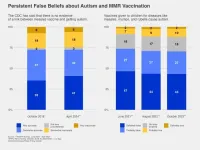(Press-News.org) May 23, 2024
Obeldesivir (GS-5245), a novel investigational small molecule oral antiviral, represents a new tool in the ongoing effort to prepare for future pandemics.
Several researchers at the University of North Carolina at Chapel Hill’s Gillings School of Global Public Health are co-authors of a new study published online May 22 by the journal Science Translational Medicine.
The study shares findings from an academic-corporate partnership between biopharmaceutical company Gilead Sciences and the Sheahan and Baric Labs at the Gillings School.
This is the same partnership that previously investigated remdesivir (sold under the brand name Veklury®). In 2020, remdesivir was authorized for emergency use and then fully approved during the COVID-19 pandemic. The drug works by stopping the SARS-CoV-2 virus from replicating. Remdesivir helps shorten time to recovery and reduces disease progression and mortality, but patients must visit a health care setting for IV administration.
Since the early days of the COVID-19 pandemic, researchers have been working on an oral antiviral drug of the parent nucleoside of remdesivir that could stop replication of the virus.
“Oral bioavailability means that you can take the medicine by mouth and do not need to visit a health care setting to receive treatment,” says Timothy Sheahan, PhD, an expert virologist and assistant professor of epidemiology at the Gillings School. “That is a potential limitation for remdesivir, which is an IV drug. With a prescription, you could take an oral antiviral at home just like you would take Tylenol.”
In the new study, oral obeldesivir was shown to reduce disease severity in mice infected with one of several different coronaviruses, including SARS-CoV-2 (which causes COVID-19), SARS-CoV and MERS-CoV. Researchers observed a dose-dependent reduction in viral replication, weight loss, lung injury and loss of lung function.
In addition, combining obeldesivir with the antiviral nirmatrelvir (an active component of Paxlovid) further improved outcomes in COVID-19-infected mice.
These results support further development of obeldesivir as a potential broadly effective anticoronaviral drug.
Gilead Sciences recently completed a Phase 3 clinical trial of the therapeutic in more than 2,000 people who tested positive for COVID-19 but did not have risk factors for developing more severe disease and were not hospitalized.
“While obeldesivir did not meet its primary clinical endpoint of reducing time to symptom alleviation in a standard risk population in the Phase 3 OAKTREE trial, it is a promising drug and no safety concerns were identified,” Sheahan says. “I think the issue is that currently, most people have stronger immunity to the virus that causes COVID-19 and the disease severity has greatly diminished since the pandemic. Early on, many people were ending up in the hospital and dying, which made the differences between placebo and treated groups stark and easily measurable. With obeldesivir, resarchers weren’t looking at prevention of hospitalization and death, but rather wanted to see how much it shortened the time for symptoms to resolve in people who are not at high risk for severe COVID-19. It’s harder to observe those subtler differences in the background of milder disease.”
Ultimately, the clinical trial assessed the safety profile of obeldesivir for use in a diverse population. Like remdesivir, obeldesivir could continue to be tested in humans for effectiveness and, if appropriate, rapidly deployed against susceptible novel coronaviruses that might emerge.
The research team also remains hopeful about the potential use of this broad-spectrum antiviral medicine against other RNA viruses.
The full list of co-authors on this study is: Fernando Moreira, Nicholas Catanzaro, Meghan Diefenbacher, Mark Zweigart, Kendra Gully, Ariane Brown, Lily Adams, Boyd Yount, Thomas Baric, Michael Mallory, Helen Conrad, Samantha May, Stephanie Dong, Trevor Scobey, Cameron Nguyen, Alexandra Schafer and Timothy Sheahan from the Department of Epidemiology at the Gillings School; Ralph Baric from the Gillings School’s Department of Epidemiology, the UNC Department of Microbiology and Immunology, and UNC’s Rapidly Emerging Antiviral Drug Development Initiative; David Martinez from the Department of Immunobiology and the Center for Infection and Immunity at the Yale School of Medicine; Gabriela De la Cruz from UNC’s Lineberger Comprehensive Cancer Center; Stephanie Montgomery from the UNC Department of Pathology and Laboratory Medicine; and Jason Perry, Darius Babusis, Kimberly Barrett, Anh-Hoa Nguyen, Anh-Quan Nguyen, Rao Kalla, Roy Bannister, Joy Feng, Tomas Cihlar, Richard Mackman and John P. Bilello from Gilead Sciences, Inc.
Contact the UNC Gillings School of Global Public Health communications team at sphcomm@unc.edu.
END
Oral nucleoside antiviral is progressing toward future pandemic preparedness
2024-06-03
ELSE PRESS RELEASES FROM THIS DATE:
Shape and depth of ocean floor profoundly influence how carbon is stored there
2024-06-03
Key takeaways
The movement of carbon between the atmosphere, oceans and continents — or carbon cycle — regulates Earth’s climate, with the ocean playing a major role in carbon sequestration.
A new study finds that the shape and depth of the ocean floor explain up to 50% of the changes in depth at which carbon has been sequestered there over the past 80 million years.
While these changes have been previously attributed to other causes, the new finding could inform ongoing efforts to combat climate change through marine carbon sequestration.
The movement of carbon between the atmosphere, oceans and continents — the carbon ...
Airplane noise exposure may increase risk of chronic disease
2024-06-03
FOR IMMEDIATE RELEASE
Monday, June 3, 2024
Contact:
Jillian McKoy, jpmckoy@bu.edu
Michael Saunders, msaunder@bu.edu
##
Airplane Noise Exposure May Increase Risk of Chronic Disease
A new study found that people who were exposed to higher levels of noise from aircraft were more likely to have a higher body mass index, an indicator for obesity that can lead to stroke or hypertension. The findings highlight how the environment—and environmental injustices—can shape health outcomes.
Research has shown that noise from airplanes and helicopters flying overhead are far more bothersome to people than noise from other modes of transportation, ...
Mental health, lack of workplace support are leading factors driving nurses from jobs
2024-06-03
Coworker and employer support are strong predictors of nurses planning to stay in their jobs, while symptoms of depression are linked to nurses planning to leave, according to a study conducted at the height of the COVID-19 pandemic by researchers at NYU Rory Meyers College of Nursing.
The research—published in the Online Journal of Issues in Nursing, a journal of the American Nurses Association—examines both pandemic-related factors and the overall work environment for nurses and can help organizational ...
U.S. health departments experience workforce shortages and struggle to reach adequate staffing levels in public health
2024-06-03
Gaps persist in hiring enough U.S. public health workers and health departments continue to face challenges in recruiting new employees, according to a new study by Columbia University Mailman School of Public Health and Indiana University. Insufficient funding, a shortage of people with public health training, and a lack of visibility for public careers, in addition to lengthy hiring processes, are cited as barriers contributing to an absence of progress for achieving a satisfactory level of workers. The results ...
Redox Science Meets Medicine at the 26th International Conference on Redox Medicine 2024 this June in Paris
2024-06-03
Redox Science Meets Medicine at the 26th International Conference on Redox Medicine 2024 this June in Paris
The 26th International Conference on Redox Medicine 2024 will take place this month, on June 27-28 at Fondation Biermans-Lapôtre in Paris, France.
With 41+ communications and participants from 20 different countries, the conference promises a diverse exchange of knowledge and ideas.
The sessions of the conference are organized around key topics, with each speaker addressing a specific ...
Albert Einstein College of Medicine names Marla Keller, MD, Executive Dean
2024-06-03
June 3, 2024—(BRONX, NY)—Marla Keller, M.D., a national leader in academic medicine and in clinical and translational research and training, has been appointed executive dean at Albert Einstein College of Medicine. In this role, Dr. Keller will work closely with Yaron Tomer, M.D., the Marilyn and Stanley M. Katz Dean at Einstein, other executive leaders at the College of Medicine and Montefiore, and the Board of Trustees to achieve the vision for the institution. As Einstein’s second most senior officer, she will drive strategic planning for the College of Medicine and provide guidance across all academic and research programs.
Dr. ...
Two-pronged attack strategy boosts immunotherapy in preclinical studies
2024-06-03
JUNE 3, 2024, NEW YORK – A novel immunotherapy approach developed by Ludwig Cancer Research scientists employs a two-pronged attack against solid tumors to boost the immune system’s ability to target and eliminate cancer cells.
The research focuses on an immunotherapy called adoptive cell transfer (ACT), which involves extracting T cells from a patient, enhancing their ability to fight cancer, expanding them in culture and reinfusing them into the patient’s body.
“While T cell therapies have shown tremendous ...
Microscopic defects in ice shape how massive glaciers flow, study shows
2024-06-03
As they seep and calve into the sea, melting glaciers and ice sheets are raising global water levels at unprecedented rates. To predict and prepare for future sea-level rise, scientists need a better understanding of how fast glaciers melt and what influences their flow.
Now, a study by MIT scientists offers a new picture of glacier flow, based on microscopic deformation in the ice. The results show that a glacier’s flow depends strongly on how microscopic defects move through the ice.
The researchers found they could estimate ...
False belief in MMR vaccine-autism link endures as measles threat persists
2024-06-03
As measles cases rise across the United States and vaccination rates for the MMR (measles, mumps, rubella) vaccine continue to fall, a new survey finds that a quarter of U.S. adults do not know that claims that the MMR vaccine causes autism are false.
The Centers for Disease Control and Prevention (CDC) has said there is no evidence linking the measles vaccine and getting autism. But 24% of U.S. adults do not accept that – they say that statement is somewhat or very inaccurate – and another 3% are not sure, according to the survey by the Annenberg Public Policy Center (APPC) of the University of Pennsylvania. About three-quarters of those surveyed ...
Type of weight loss surgery women undergo before pregnancy may influence children’s weight gain
2024-06-03
BOSTON—The type of weight loss surgery women undergo before becoming pregnant may affect how much weight their children gain in the first three years of life, suggests a study being presented Monday at ENDO 2024, the Endocrine Society’s annual meeting in Boston, Mass.
Researchers found children born to women who underwent the bariatric procedure known as sleeve gastrectomy before they became pregnant gain more weight per month on average in the first three years of life compared with children born to women who had the less common ...




